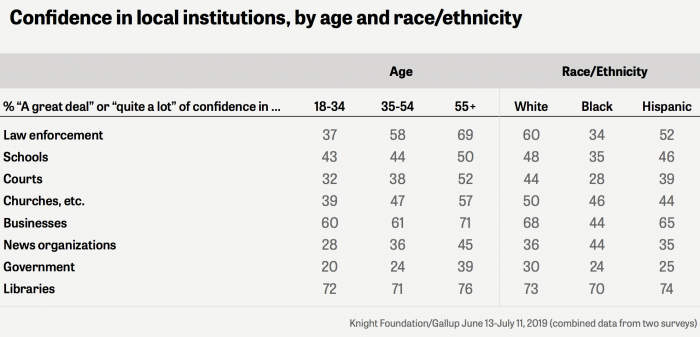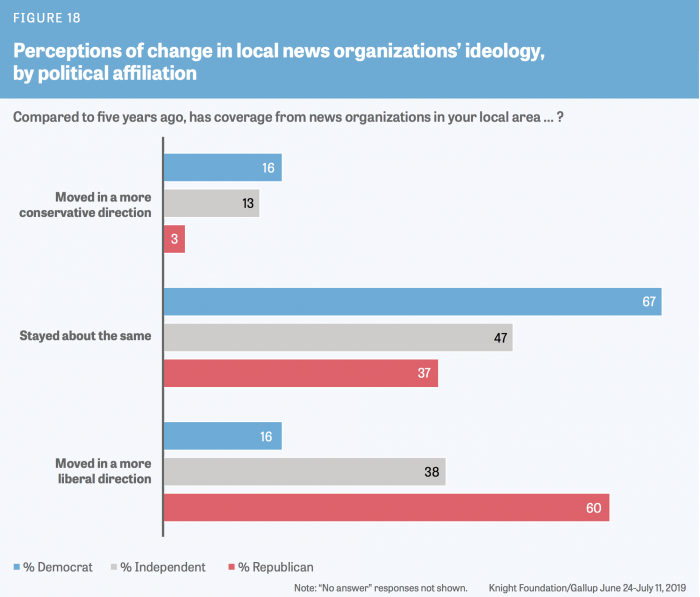
Local news is more trusted than national news, yes. But that’s largely because national news is not very trusted, especially by Republicans, according to a new study from the Knight Foundation and Gallup.
The 2010s’ media industry has been particularly brutal to local news outlets, slicing staffs and closing many newsrooms around the country with devoted efforts to help the remaining outlets transition to digital. Local news is important to save for many civic reasons — see the Local News Lab’s research roundup — but another oft-cited reason is because local news brought more harmony and faith in journalism to its communities. People trusted it, a word that’s at the core of journalism’s problems today (but not the only one). “The shorter the distance between our neighbors and our news, the stronger our community. There is strength in local, and local leads to trust,” Knight president Alberto Ibargüen said at the Knight Media Forum in February, announcing the foundation’s doubled-down commitment to local news efforts.There is still strength in local, this new study finds, but local doesn’t necessarily lead to trust. Local news is the second-least trusted local institution, just ahead of local government (topped by libraries, law enforcement, businesses, churches, and more). And respondents to the three surveys as part of this study said that while local news does a good job with highlighting the local sports teams, it can do more with holding local officials accountable. But that’s precisely where local news could also fall into the trap of losing trust — by trying to improve coverage of more nationally inflaming topics on a local level, the researchers found.

“The study findings present a dilemma for local news. The data suggest that moving into more aggressive coverage of social and political issues could further polarize views — and possibly lead to an erosion of trust. However, these are not issues that local news organizations can abandon without abdicating some of their mandate to help democracy flourish,” the report states. “The more it wades into coverage of national issues, the more vulnerable it may be to accusations of bias and a loss of community trust.”
“Local news outlets don’t exist in a vacuum, as this study emphasizes. The same forces that have eroded trust in the national media are now beginning to filter down to the local level,” Knight’s director of learning and impact John Sands wrote. “While more Americans trust their local news outlets more than national, that trust is more fragile than previously understood — and vulnerable to the same perceptions of partisan bias that threaten confidence in the national media.”

“Local news” is a pretty broad term — the researchers asked respondents to list their news sources rather than define local news for them, and the answers vary from “Bret Baier” to “YouTube” to “the Chicago Tribune,” though the top results were Fox News, CNN, and “local newspaper (non-specific).” At another point they identify local news as “a local newspaper; local television station; website or app produced by a local individual, group or organization; local radio station; local magazine” (all followed by “(in print, online or on an app)”).
The study also unpacks the public’s view on trust from different political corners and uses of local news. Some highlights:
Majorities of Americans say local news is doing an “excellent” or “good” job in fulfilling many of its responsibilities. The most notable exceptions are making people feel inspired and holding local leaders accountable for their actions — 52% and 60%, respectively, feel local news does only a “fair” or “poor” job of these tasks.

The largest partisan gap emerges over providing factual local news reports, with 75% of Democrats saying local news organizations are doing an “excellent” or “good” job, compared with 54% of Republicans. Less than half of Democrats, independents or Republicans say local news does a good job holding leaders accountable for their actions….
Overall, the local-national trust gap is driven by Republicans and, to a lesser degree, independents, but this gap is more a function of Republican and independent distrust of the national news media than of high levels of trust in local news media.

Democrats are more likely than Republicans to trust local news to perform their roles, but the gap is especially wide when it comes to getting the facts right. Although 51% of Americans do not perceive that their local news has become more biased in recent years, those who believe it has are more likely to see a shift toward liberal views.
That last data point is the highest risk for local news — aside from, you know, finding a sustainable way to support itself — going forward. If you lose the public’s trust and utility for you as a news outlet, what do you have left?
Gallup researchers tried to answer the question of “do Americans trust local news more simply because it is local” with an experiment that compared respondents’ reaction to a news item identified as from a local or national publication. Good news: Respondents did trust the article when it was identified as local versus national. According to the report: “These differences in ratings of the ‘local’ versus ‘national’ news story are modest but statistically significant and indicate a small gain in trust merely from identifying a story as being from a local news organization rather than a national one…A small reservoir of goodwill exists toward local news organizations because they are local, but this could quickly dry up if Americans perceive more political bias in coverage.” (Emphasis mine.)
That’s also a reason why the widely reported growth of Sinclair Broadcast Group — the conservative company known for injecting its ideology into its broadcasts — carries extra risk for local news. Whether a TV viewer agrees or disagrees with Sinclair’s politics — or even if she never watches that station at all — its mere presence can increase perceptions of bias and decrease trust for the entire local news ecosystem.

The crux of this issue:
Perceptions of whether local news is more politically biased today than in the past offer a window into how Americans’ attitudes toward the local news media may shift in the future. An increase in perceived bias may forewarn of a deterioration in trust of local news organizations.
About as many Americans perceive shifts in the ideological leanings of local news organizations compared to five years ago as indicate there has been no change. A slim majority, 51%, say local news coverage has stayed about the same, while 37% see movement in a more liberal direction and 11% in a more conservative direction.
The partisan differences of perceived shifts in the ideological leanings of local news are substantial. Six in 10 Republicans say news organizations in their local area have moved in a more liberal direction, compared with 16% of Democrats who say local news organizations have moved in a more conservative direction. Two-thirds of Democrats perceive no change in local news ideology. Among independents, nearly half (47%) say news organizations in their local area have stayed the same, 38% say they have moved in a more liberal direction and 13% say a more conservative direction.
Trust in local news hasn’t crashed and burned as much as that in national news; but just as “local” isn’t a one-size-fits-all kind of word, neither is finding a solution for rebuilding “trust.”
The full report is available here.